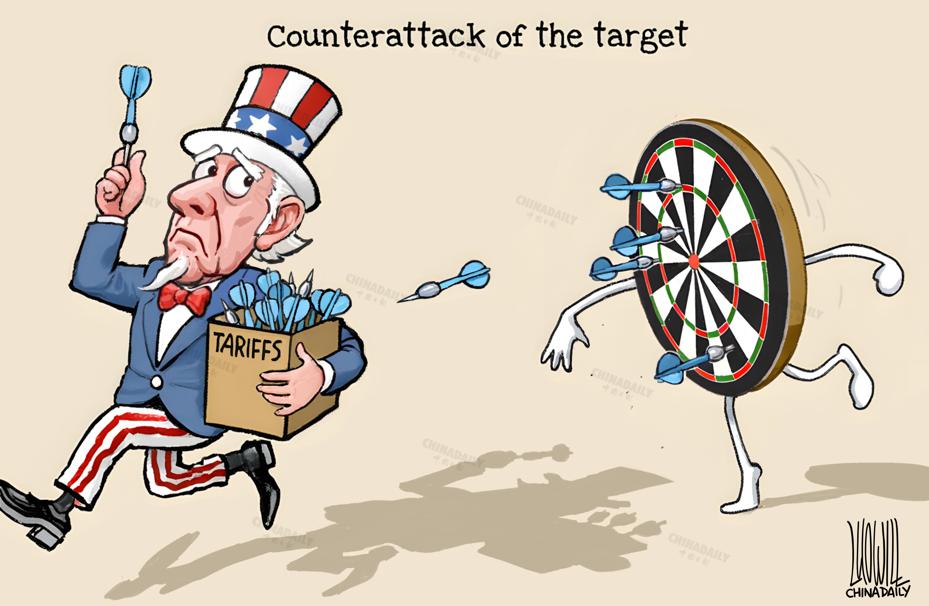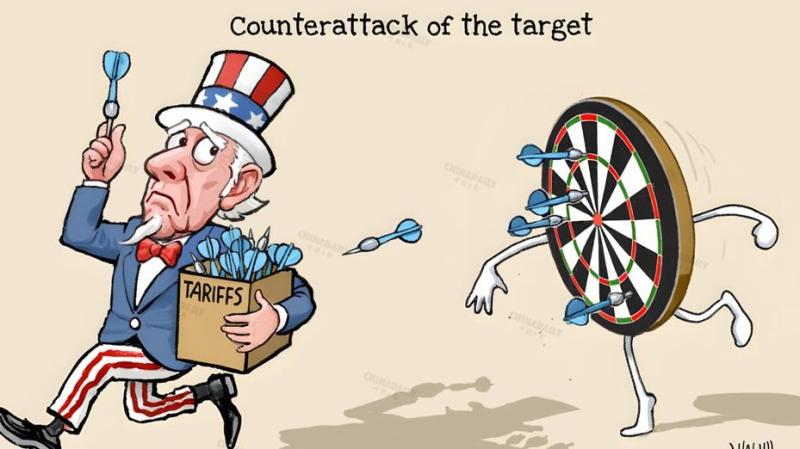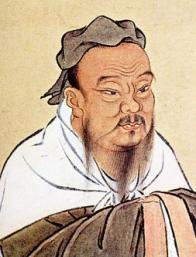Can tariffs make the US great again?
By: Guo Jiulin

Can tariffs make the US great again?

On February 10, the US administration announced a 25 percent tariff on all steel and aluminum imports into the United States "without exceptions and exemptions". It also plans to impose a reciprocal tariff policy that aims to impose tariffs on multiple countries or regions at the same rate as US exports. Just a week ago, the government announced a 25 percent tariff on goods from Canada and Mexico and a 10 percent tariff on Chinese products.
Obviously, the US has not learned from the past. In 2018, the US imposed comprehensive tariffs on Chinese solar panels, washing machines, steel, and aluminum products, while also launching an investigation into tariffs on $5 billion to $60 billion worth of Chinese goods. The result? Higher costs for US imports, a widening trade deficit with China, and disruptions to global supply chains. Moreover, the trade protectionism damaged US international credibility, making trading partners hesitant to cooperate.
Now, the US is once again doubling down on tariffs. Will this new round of tariffs achieve its intended effect? The answer is likely "No". According to a University of Chicago survey, 98 percent of economists agree that the high tariffs are mainly borne by American consumers. A Morgan Stanley report pointed out that Trump's tariff hike could reduce the US economic growth by 0.7 to 1.1 percentage points in the coming year. Further analysis from US think tanks suggests that a general 10 percent tariff could lead to retaliatory tariffs from other countries, causing a 0.5 percent drop in US GDP in the short term and a 1-1.5 percent decline over the next three years.
A Brookings Institution study found that tariffs intended to protect the US steel industry would, paradoxically, increase costs for enterprise reliant on American steel, thereby reducing demand and potentially leading to job losses in the sector.
The US administration should have foreseen these consequences, so why do they persist?
The new tariff policy may not be purely about trade. Instead, it could be understood as a contraction of America's global strategy and a desperate attempt to extend US hegemony.
On the one hand, the rise of China-evidenced by its advancements in the sixth-generation aircraft, various types of naval vessels, popular apps such as TikTok and Little Red Note, and breakthroughs in AI represented by DeepSeek-has exacerbated American anxieties. Faced with this reality, the US seeks to secure North America as a strategic stronghold, buying time to counter China's rise. The ambition to annex Canada, buy Greenland, reclaim the Panama Canal, rename the Gulf of Mexico the Gulf of America, and impose extremely high tariffs on Canada and Mexico aligns with this vision. By pressuring its neighbors through tariffs, the US aims to extract concessions, access strategic resources, dominate routes like the Arctic Ocean and maintain its long-term economic and national security interests.
On the other hand, the new round tariffs also serve to control Europe. While the policy does not explicitly mention Europe, its true target is clear. The US aims to ensure that Europe continues to "feed" its own economy, mitigate inflationary pressures, and prevent the EU from becoming an independent geopolitical force that could challenge American dominance. Moving forward, the US administration is likely to force the EU to make concessions in agricultural subsidies, government procurement, and technical standards; exploit divisions among EU member states to weaken the bloc's common trade policy; use tariffs to limit Europe's reliance on China for technology and supply chains; raise taxes on European new energy products to protect American industries; leverage tariffs to compel Europe to buy American energy first, replacing Russian or Middle Eastern supplies. A weak and compliant Europe remains in the US interest.
However, the broader picture reveals a deteriorating US political climate. Institutional corruption is fueling inflation, liberal democracy is losing its global appeal, and the country's international standing is weakening.
Ultimately, the US tariff policy will not reverse its decline, instead, it is likely to exacerbate existing problems. To succeed in this high-stakes gamble, the Trump administration would need exceptional resilience, strategic foresight, and-most importantly- time. Yet, with only four years to execute these ambitions, the clock is ticking.
Guo Jiulin is a professor of American studies in Dalian Minzu University. The views don't necessarily represent those of China Daily.
The administrator of this group reserves the right, along with the site moderators, to moderate all and any postings to this group, including the right to enforce the ToS, the CoC, and also including anything that the administrator deems within his sole discretion to be offensive, including and not limited to off topic or 'no value' comments, with the power to delete in exercising those rights.
It would be best, therefore, to be civil in posting on this group.
By now it should be well known that I am unable to open certain sources, videos and pictures. If I cannot, I will ask that they be described and explained. If the poster refuses to comply, their comment will be deleted. Instagrams are banned.

Tags
Who is online
55 visitors



This is an opinion based upon the opinions of some named experts in the relevant field. It is one viewpoint and there are bound to be others. Anyone who comments can only voice opinions as well. IMO only time will tell if what is predicted will occur.
US economic policy guided by the principles of free trade and monetary controls has not provided a broad prosperity. The facts are that the economic security of the US population has eroded considerably over the last 30 to 40 years. 97 pct of the US Federal debt has been created since 1981. The US trade deficit has grown considerably even after taking steps to alleviate the energy crunch. (Prices of oil are influenced by global markets but not by lack of domestic production capacity.)
Since free trade and monetary controls have failed, it's time to try something different. What guides China's economic policy? China definitely has not been guided by the principles of free trade and monetary controls. Hasn't China's economic policies been guided by the principles of strategic trade and industrial policy? Doesn't China engage in proactive policies to protect its domestic industries and domestic jobs?
How does Trump's actions concerning the economy differ from those of Xi Jinping? If it's good enough for China then why is it such a bad idea for the United States?
I'm not an economist, and I never studied political economy, so the topic is not one that I'm able to discuss on an academic level. But I haven't seen Xi Jinping start a tariff war on the rest of the world. I have seen Xi Jinping eradicate abject poverty in China, and that tells me he is trying to make life better for the Chinese people. As for what Trump/Musk is doing, in my amateur opinion, I believe it is only going to make life worse for the majority of Americans, although not for the very wealthy. There are lots of predictions, but it will take a little time to see how things go.
But you do live in China. At the least, you have real world experience with the kitchen table economics of Chinese consumers.
Did Xi rely on only government handouts to address poverty? Hasn't Xi and the ruling party used economic policies to develop industry, create jobs, and create export trade to provide the revenue to address poverty and improve the standard of living for the Chinese people? Circumspect ignorance can't deflect attention away from the fact that China's economy has grown through industrialization.
That tries to push the political buttons. But the facts are the economic policies of the United States are quite different than those of China. And the economic policies of the United States of the last 30 to 40 years has not delivered prosperity for its people. The import dependence of the United States stands in stark contrast to China's development of an exporting economy. The policies of the United States to regulate the economy using monetary methods is completely different than China's use of industrial policy that makes the exporting economy possible.
Don't avoid the ultimate question. Why would the United States adopting the same guiding principles employ by China to shift US economic policy be a bad thing? The United States wants the same economic successes that China has achieved.
The Chinese government did and is doing much more than that. Yes, it funded the building of roads and highways to previously difficult to access rural communities, which allowed for easy transporting of rural-grown and built products to good markets, and the bussing of children to schools and universities, both of which benefitted the rural economy. They sent experts to train the local people new and better farming and manufacturing methods to increase their profits, and many remained or are regularly replaced to make sure there is no backslide in the increased productivity of the rural people. New housing was also built for many of the rural people. And so, perhaps augmented by the cultural difference with Americans in that the good of the many is more important that the good for the self, and the tremendous impoirtance of family togetherness, you do not see Chinese people living under bridges as compared to about three quarter of a million Americans who live on the streets. Will Trump's methods eradicate abject poverty as Xi has done, or will only the well-off benefit even more?
I'm sorry, I can't equate Trump's policy of threatening and imposing economic penalties such as tariffs and forcing annexation as being at all similar to what China has been doing.
I think I'll add my 2 cents.
Adam Smith taught us that free unrestricted trade would determine which particular industry in any country can produce the greatest good for the world’s consumers, whether it was through lower prices or better quality, or maybe even both. I don't think Smith ever imagined that a country such as China, with a planned economy, would use the tactic of dumping products at a loss to capture market share, subsidize their businesses’ overhead to protect domestic employment or seek to create a monopoly over a strategic industry. In the case of China that is what happened.
Others such as Mexico have used cheap labor to undermine America's manufacturing sector. India charges enormous tariffs on US auto makers and it has also affected many other US industries.
We rebuilt Europe, which we defend and continue to give special trade concessions to. It is now 2025.
I think it is time for change.
I don't know anything about dumping but I do know that even the most powerful of nations do subsidize. At least you haven't said China chains its workers to their workplaces which others around here seem to think.
Are you convinced that the Trump/Musk tactics are going to be beneficial for Americans?
Did Adam Smith focus his attention on the role of middleman merchants in the economy? Smith did discuss the interplay between producers and consumers. But Smith's observations did not assume that non-producing merchants were the source of supply within an economy.
We as consumers do not live in a global economy. Only recently has it become possible for average consumers to buy directly from foreign producers. But even that latest innovation depends upon the services of non-producing middleman merchants. The global economy functions on bulk purchases of commodities and goods by middlemen merchants. The US economy has modeled itself on "postal service" priorities that are critically important, does create jobs, but is not productive so cannot create real wealth.
People aren't arguing about production. People are arguing about supply and prices. Those are the concerns of middlemen merchants who can buy from anywhere around the world. I don't see how it is possible to apply Adam Smith's theories to an economy that does not produce for itself. It has been necessary to expand the economy beyond our borders, in a contrived manner, so as to retain the relevance of Adam Smith's theories.
The Federal government has been attempting to regulate the economy with monetary policy. The Federal Reserve only exerts control over the money supply to address inflationary and deflationary imbalances in the economy. The Federal Reserve does not have the tools available to influence supply and demand of staple goods in our economy. As a result, 97 pct of the Federal debt has been created since 1981.
The economic policies of exporting countries are starkly different that of the United States. The industry based economic policies of China, Mexico, and Asian rim countries has lifted their populations out of poverty and improved living standards for their people. Isn't that what the United States wants? Why would it be wrong for the United States to follow the models of those foreign economies to deliver the same economic improvements for the people of the US?
I think that tariffs can have a positive effect on an economy, if they are used sparingly and correctly aimed at achieving a specific objective rather a punitive tool designed to punish some and force others to actions they are less than enthusiastically inclined to pursue.
Trump is using tariffs as a club rather than as small wights added to a scale to tip it slightly in favor of one side or another.
It is hard to argue with a position that the country would be better off if a majority of the consumables f that economy were produced within the economy, but that simply not the current configuration of the world economy.
It is math, simple math --- the American people want widgets, widgets are currently made in China by a workforce paid $X per hour, if those widgets were made in the US by a workforce making $10X per hour they would be much more expensive, if the US adds a tariff that bridges the gap between $X and $10X per hour construction cost the result is the same - the widgets are much more expensive to the US consumer.
How big an impact will those tariffs have on kitchen table economics? Will tariffs dramatically affect the price of home, auto, life, and health insurance? Will tariffs dramatically affect the cost of childcare? Will tariffs dramatically affect the cost of education? Will tariffs dramatically impact the prices of subscription services and streaming services? Will tariffs dramatically impact the sale of second hand goods?
So why is so much political capital being expended to defend a policy environment that impedes domestic production of staple goods? The core of that defense relies upon expanding the economy beyond our borders and outside the jurisdiction of our government economic policies. The United States cannot regulate the global economy; therefore, (so the argument goes) the United States government should not interfere.
You know, we import a lot of steel. Steel produced in Europe. Steel produced in Japan. These are not low wage labor forces. Foreign made steel is not cheap because of low wage competition. The United States has plenty of iron ore available. Labor rates are competitive with foreign suppliers. And steel produced in the United States doesn't have the added cost of long distance transport. So, why does the United States import so much steel? Why does US Steel need a Japanese buyer?
Yes, there are some commodities and goods that the United States cannot produce for itself. But why can't the United States compete with foreign suppliers for goods and services invented and developed in the United States? Why does the United States need free trade with other high wage countries?
Nerm-L
I have no idea if you agree or disagree with the points I made but I thank you for your insight.
As I thought I pointed out there is a place for tariffs in US economics but they should be used with subtlety of a brain surgeon rather than with the wild abandon of a lumberjack (which is what Trump is doing right now).
You ask tough questions that neither supporters or detractors of the tariffs can answer right now - but it will not take long for the effe cts (good or bad) to hit the economy and then we can talk again.
Thanks again for the feedbacl.
Morning..I just want to know is Trump going to put the tariff on Alcoa's aluminium and bauxite exported from Australia to the US which is owned by America?